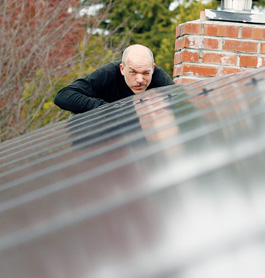home | metro santa cruz index | news | santa cruz | news article

ROOFTOP DIY: Live Oak resident Greg Ginner, who saved money by setting up his solar panels himself, says going solar is worth it at almost any cost.
Sun Burn
At 9 percent interest, new solar program is less than ideal
By Curtis Cartier
AS SANTA CRUZ'S much-trumpeted Renewable Energy Assessment District inches closer to implementation, its fate increasingly seems tied to the 9 percent interest rate participants would pay to join. The program, dubbed CaliforniaFIRST and administered by the quasi–public organization California Communities, would let homeowners purchase alternative energy systems like solar panels with loans financed by the sale of "special district"-issued bonds. The plan targets homeowners that lack enough home equity or good credit to qualify for a bank-issued loan; additionally, instead of placing the debt obligation on a specific individual, it would attach a lien to the property itself that would remain in place until the loan was repaid through property taxes.
The loans would be made at a fixed rate of 9 percent interest, about double the current home equity loan rate offered to homeowners with sufficient equity or credit through banks like Santa Cruz Community Credit Union. And at last week's Santa Cruz City Council meeting, where councilmembers voted to officially join the program, more than a few city leaders worried that, unless the rate is lowered, it may present a bum deal for residents looking to go green.
"It's really important that we get that rate down somehow," said Santa Cruz Mayor Mike Rotkin at the Jan. 12 meeting. "We have to make it worthwhile for people looking to get involved."
City planners and environmental advocates who are working on the plan say a State Energy Program grant could be awarded next month that could buy down the interest rate to 7 or 8 percent. They also say, however, that winning the highly competitive grant is far from assured. Santa Cruz's climate change coordinator Ross Clark has spearheaded the city's efforts to join the program and says that besides lowering the loan interest rates, winning the SEP grant may be necessary just to keep the city and county of Santa Cruz on board.
"The grant money would also cover some startup and administrative costs for local governments, and my concern is that, if we don't receive it, that the county, and to the same degree the city, could walk away," says Clark. "But I also think that once the bond market gets comfortable with the plan, the rates will come down significantly."
The city of Berkeley rolled out a nearly identical program in November 2008, when its 40 open slots sold out in nine minutes flat. Today, however, Dan Lambert, Berkeley's sustainable energy programs manager, says roughly 80 percent of those who signed up for the program dropped out of it later when they found better sources of funding. And since Berkeley's rate of 7.75 percent proved unable to woo participants over the long run, he says Santa Cruz is likely on course to see the same outcome.
"People who signed up simply found cheaper money elsewhere," he says. "What it did, really, was steer people toward home equity financing that they hadn't, up to that point, looked into."
Berkeley is now joining Santa Cruz and 144 other cities and 14 counties, including Monterey and Santa Clara counties, in the current proposal in hopes that the sheer number of participating governments will improve the investment rating of the entire program. But for solar system users like Greg Ginner of Live Oak, a solar system that cuts electricity costs to nearly nothing is worth every dollar, even if 9 cents of each goes toward interest.
"I got a system financed at 2.75 percent, but even at 9 it can definitely be worth it," says Ginner, who has a 4-kilowatt Enphase Energy solar system on his house that he says brought his monthly energy costs from $150 to around $20. "It all depends on your electric bill. If you've got $150 or more in electricity costs, it's a slam-dunk. Plus you can write off all your interest payments when you do your taxes."
Send a letter to the editor about this story.
|
|
|
|
|
|